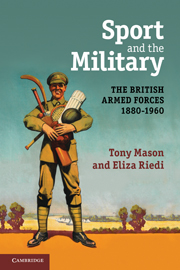Book contents
- Frontmatter
- Contents
- List of illustrations
- Acknowledgements
- Introduction
- 1 The growth of service sport, 1880–1914
- 2 Officer sports and their critics, 1880–1914
- 3 Sport in the Great War
- 4 The amateur era, 1919–39
- 5 Soldiers, sailors and civilians
- 6 A different kind of war
- 7 The national service years: the summit of military sport?
- Conclusion
- Select bibliography
- Index
5 - Soldiers, sailors and civilians
Published online by Cambridge University Press: 05 December 2012
- Frontmatter
- Contents
- List of illustrations
- Acknowledgements
- Introduction
- 1 The growth of service sport, 1880–1914
- 2 Officer sports and their critics, 1880–1914
- 3 Sport in the Great War
- 4 The amateur era, 1919–39
- 5 Soldiers, sailors and civilians
- 6 A different kind of war
- 7 The national service years: the summit of military sport?
- Conclusion
- Select bibliography
- Index
Summary
I don’t think that before I came to Hampshire, I had ever talked to a soldier. They were a race apart to me.
William Pickford, Secretary of Hampshire Football Association in his ‘Veterans’ Column in the Portsmouth Football MailDavid French has recently reminded us that one of the ideas behind the reforms of the army in the second half of the nineteenth century was to raise the status of the regular soldier in the eyes of the rest of the population. French has pointed to the paradoxical attitudes held by many late Victorians who embraced a ‘pervasive popular militarism’ largely based on the role of the army and navy in constructing and maintaining the British Empire while at the same time having a very low opinion of those soldiers and sailors who made up the bulk of the other ranks in both services. While toy soldiers and Boy’s Own stories of imperial adventures were popular among the young, the older generation were excited by the exploits of military heroes such as Gordon, Roberts and Baden-Powell. Moreover military parades and regimental bands were often part of public displays which appealed across class, generation and locality. But the ordinary soldier was often criticised for drunkenness, hooliganism and sexual immorality. Largely recruited from the lowest of the low, they were not respectable and often refused entry to parts of theatres, coffee shops, hotels and even some public houses. When R. J. Kentish joined the Royal Irish Fusiliers he thought the men ‘giants’ but noted that ‘they had the … habit of drinking an average of at least 15 pints of beer per man on pay-days’, which ‘occasioned much crime and a … very long orderly room daily’. The Cardwell-Childers reforms of the 1870s aimed to embed regular infantry regiments within their county and city communities with the establishment of a permanent depot and a clear, geographical recruiting area. The hope was to develop a shared sense of identity between civilians and their local regiments. This chapter will explore the relationship between the development of modern organised sport in Britain between the 1880s and the 1930s and the growth and role of sport in the armed services. Sport was one of the ways in which regiments might mix more or less freely with their civilian neighbours. The aim of this chapter will be to look in more detail at these sporting relations, first at the local level, then at the level of the key national sporting organisations such as the Football Association, the Amateur Athletic Association and the Rugby Football Union. We will try to explore military influences on civilian sport and attempt to estimate the impact of civilian sport on the military.
- Type
- Chapter
- Information
- Sport and the MilitaryThe British Armed Forces 1880–1960, pp. 144 - 177Publisher: Cambridge University PressPrint publication year: 2010



